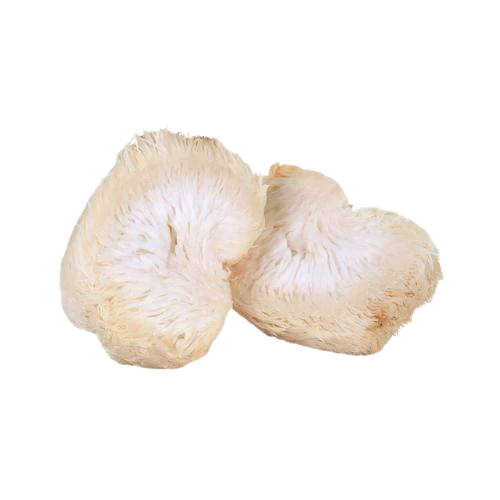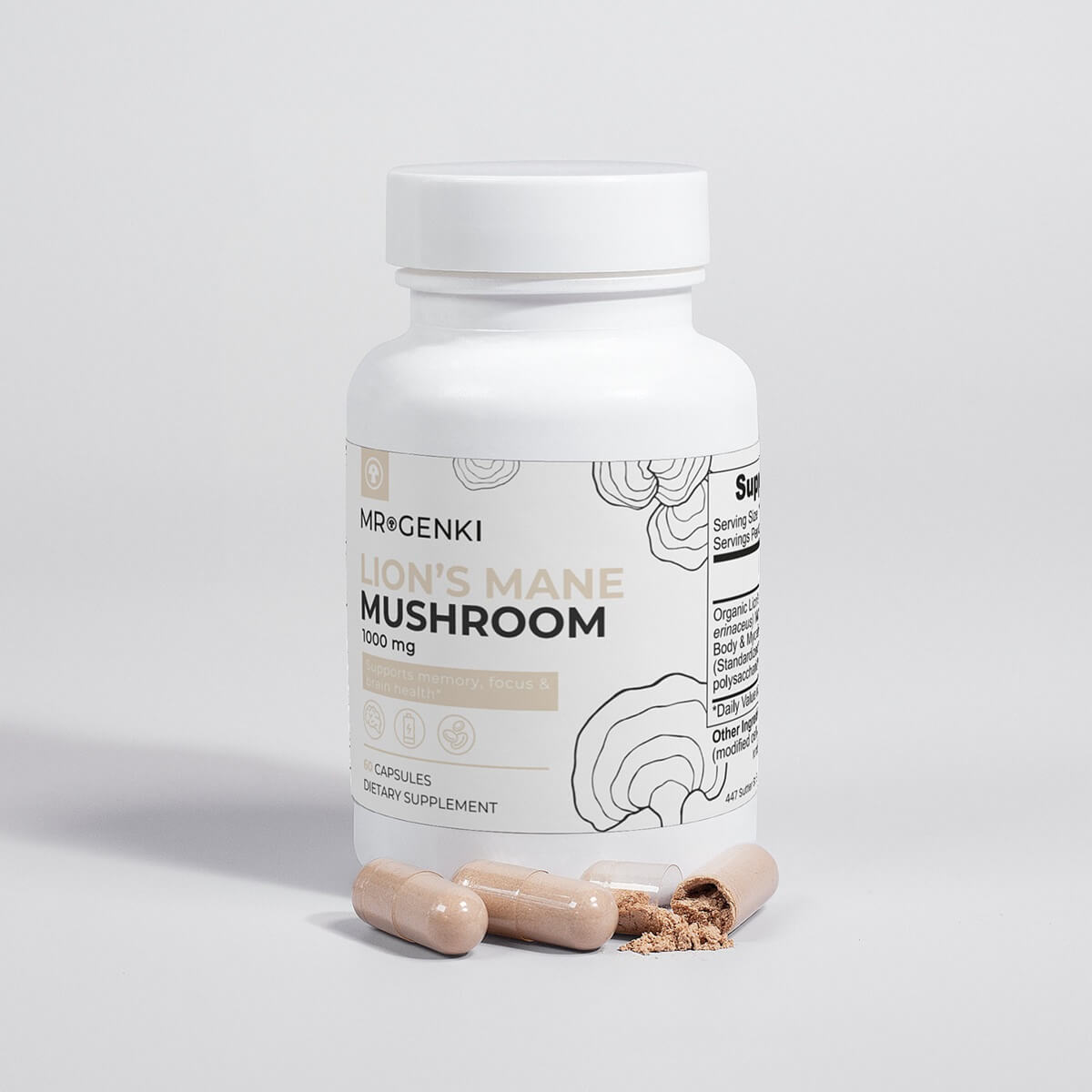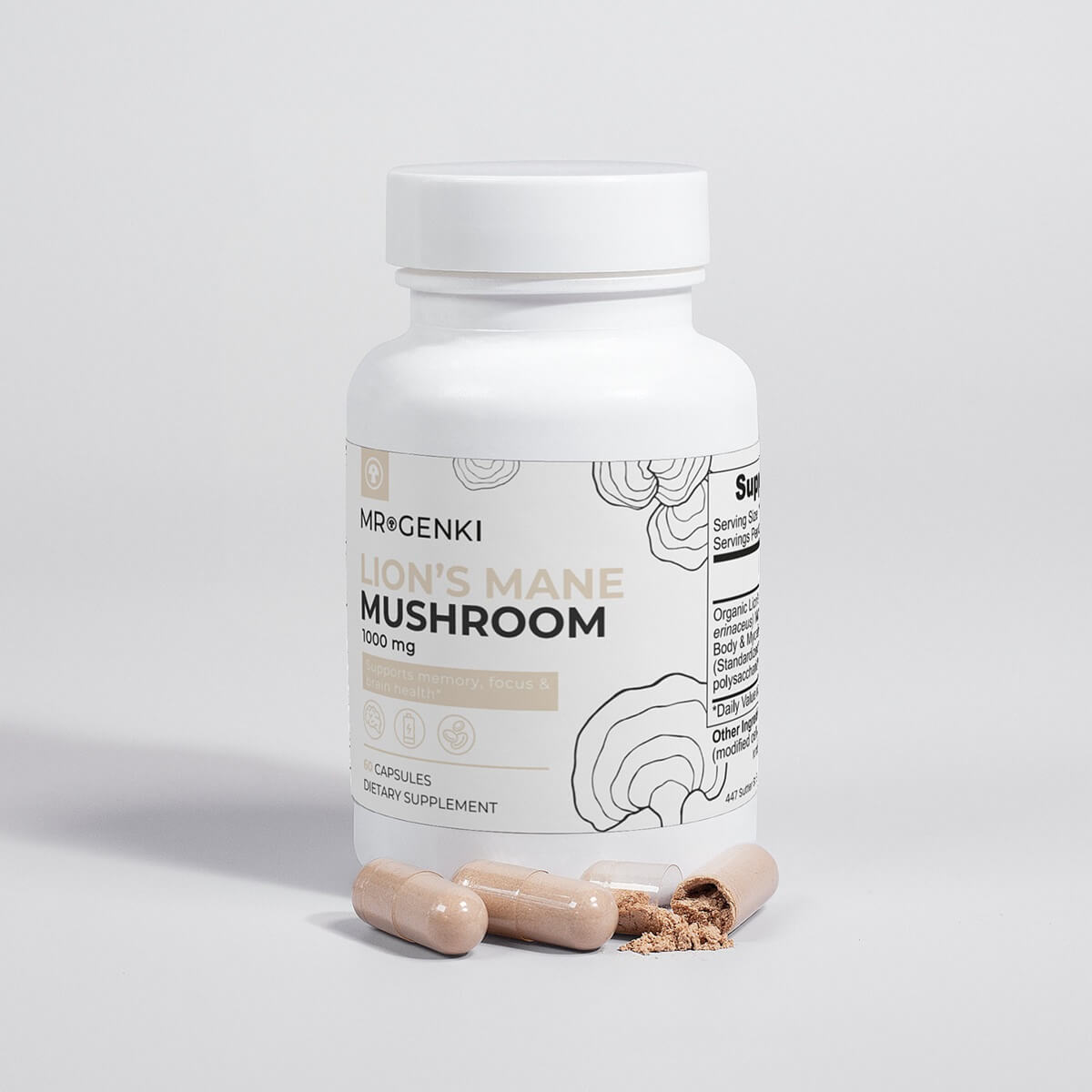-
Memory and cognition
-
ADHD Support
-
Mental clarity
Powerful Lion's Mane Mushroom Benefits
+ ADHD Support
+ ADHD Support
Lion's Mane ability to enhance focus and cognitive function suggests potential benefits for individuals with ADHD.
+ Cognitive Enhancement
+ Cognitive Enhancement
Lion's Mane is renowned for its ability to improve mental clarity, focus, and memory, making it valuable for cognitive health.
+ Neuroprotective Properties
+ Neuroprotective Properties
Studies suggest that Lion's Mane may support brain health by promoting the growth and protection of neurons, potentially beneficial in neurodegenerative diseases.
+ Stress Relief
+ Stress Relief
Its adaptogenic properties help in managing stress, offering a natural way to maintain balance during stressful times.

Lion's Mane ability to enhance focus and cognitive function suggests potential benefits for individuals with ADHD.
Lion's Mane is renowned for its ability to improve mental clarity, focus, and memory, making it valuable for cognitive health.
Studies suggest that Lion's Mane may support brain health by promoting the growth and protection of neurons, potentially beneficial in neurodegenerative diseases.
Its adaptogenic properties help in managing stress, offering a natural way to maintain balance during stressful times.
-
Vegan
-
Non-GMO
-
Gluten-free
Us vs. Them

Further Benefits of Lion's Mane Mushroom
Lion's Mane Mushroom supplement, also known as yamabushitake, is a species of mushroom that has been well-studied for its medical use in countries such as China, India, Japan, and Korea.
Only recently has Lion's Mane made its way into the Western world as a supplement to improve focus and act as a holistic energy source for the body.
In addition to its known benefits for cognition, brain health, and ADHD, Lion's Mane offers several other significant health advantages:
Mood Regulation: Lion's Mane is believed to impact mood positively by influencing the production of neurotransmitters like serotonin and dopamine.
This can lead to improved emotional balance and a reduction in symptoms associated with mood disorders.
Energy Boost: The mushroom may contribute to increased energy levels by supporting overall brain health and reducing inflammation, which in turn can reduce feelings of fatigue and lethargy.
Digestive Health: Traditionally used for gut health, Lion's Mane may aid digestion by reducing inflammation in the gastrointestinal tract and supporting the growth of beneficial gut bacteria.
Anti-Inflammatory and Antioxidant: Lion's Mane contains compounds like hericenones and erinacines, which have anti-inflammatory and antioxidant properties.
These compounds can help combat oxidative stress and inflammation in the body, potentially reducing the risk of chronic diseases.
Overall Well-being and Health: By addressing factors like mood, energy, digestion, and inflammation, Lion's Mane contributes to a holistic improvement in health and well-being.
This multi-faceted approach is what makes Lion's Mane a valuable supplement in a health-conscious lifestyle.
Clinical Studies on the Benefits of Lion's Mane Mushroom
Neurotrophic properties of the Lion's mane medicinal mushroom, Hericium erinaceus (Higher Basidiomycetes) from Malaysia
This research evaluated the effects of Lion's Mane on nerve growth factor (NGF) synthesis and neurite outgrowth in neuroblastoma-glioma cells.
It found that compounds in Lion's Mane, such as hericenones and erinacines, can induce NGF synthesis, which is crucial for neuron health.
Research Source
Chemistry, Nutrition, and Health-Promoting Properties of Hericium erinaceus (Lion's Mane) Mushroom Fruiting Bodies and Mycelia and Their Bioactive Compounds
This study suggests that Lion's Mane has potential utility in treating motor dysfunction, Alzheimer's disease, and other forms of dementia.
It emphasizes the mushroom's cognitive-enhancing properties.
Therapeutic Potential of Hericium erinaceus for Depressive Disorder
This research highlights the various health benefits of Lion's Mane, including its use in treating cognitive impairment, Parkinson’s disease, and Alzheimer’s disease, demonstrating its versatile therapeutic potential.
Research source
Alzheimer's Drug Discovery Foundation - Lion’s Mane & Your Brain
A small clinical trial on patients with Alzheimer’s disease found that Lion’s Mane treatment over 49 weeks improved daily living activities, although no significant improvements in cognition were observed compared to the placebo group.
Research source
The Acute and Chronic Effects of Lion's Mane Mushroom Supplementation on Cognitive Function, Stress and Mood in Young Adults: A Double-Blind, Parallel Groups, Pilot Study
This pilot study investigated the acute and chronic cognitive and
mood-enhancing effects of Lion's Mane in a healthy, young adult cohort.
It revealed improvements in speed of performance and a trend towards reduced subjective stress.
Research source

Sustainably Sourced, Consciously Crafted
At MrGenki, our Lion's Mane Mushroom is more than just a product; it embodies our pledge to sustainable wellness.
Responsibly sourced from the verdant mushroom farms across America, each capsule of our Lion's Mane Mushroom captures our commitment to environmental stewardship and the health of our planet.

Lion's Mane Mushroom History
Lion's Mane Mushroom, scientifically known as Hericium erinaceus, has a rich history rooted in traditional Chinese, Japanese, and Indian medicine.
For centuries, it has been valued not only for its unique culinary qualities but also for its medicinal properties.
In these ancient cultures, Lion's Mane was often used for digestive health and as a tonic for overall well-being.
It was also believed to enhance brain function and memory, and was used in treatments for various neurological conditions.
The mushroom was highly esteemed for its rarity and distinctive, lion's mane-like appearance, which led to its common name.
LEARN MORE ABOUT Lion's Mane Mushroom
Lion's Mane Mushroom FAQs
What are the negative effects of Lion's Mane?
Generally, Lion's Mane is considered safe and well-tolerated.
However, some individuals may experience mild side effects, such as digestive upset or skin rash, particularly if they are allergic to mushrooms.
Is Lion's Mane addictive?
There is no evidence to suggest that Lion's Mane mushroom is addictive.
It does not contain any addictive substances and is not known to cause dependency.
In fact, it is often prized for its natural health benefits without the risk of addiction associated with some synthetic nootropics.
Does Lion's Mane give you energy?
Lion's Mane can contribute to increased energy levels indirectly through its cognitive-enhancing and neuroprotective effects.
By improving brain function and reducing inflammation, it may help reduce feelings of fatigue and lethargy, leading to a perception of increased energy.
However, it does not act as a direct stimulant like caffeine.
Should you take Lion's Mane in the morning or at night?
The best time to take Lion's Mane depends on individual needs and responses.
Some people prefer to take it in the morning due to its potential to enhance focus and cognitive function, which can be beneficial for daytime activities.
Others find it helpful at night, as it may support relaxation and the improvement of sleep quality.
It's advisable to start with a small dose to see how your body reacts and then adjust the timing accordingly.
Can Lion's Mane damage the liver?
There is no substantial evidence to suggest that Lion's Mane mushroom causes liver damage.
In fact, some studies indicate potential liver-protective effects due to its antioxidant properties.
However, as with any supplement, it should be used responsibly, and individuals with pre-existing liver conditions should consult a healthcare provider before use.
Is Lion's Mane good for gut health?
Yes, Lion's Mane may be beneficial for gut health.
It contains compounds that can promote the growth of beneficial gut bacteria and reduce inflammation in the gastrointestinal tract.
These properties may contribute to improved digestive health and overall gut function.
What to avoid when taking Lion's Mane?
While Lion's Mane is generally considered safe, it's advisable to avoid taking it in combination with other supplements or medications without consulting a healthcare provider, particularly those that affect blood clotting or blood sugar levels.
Additionally, individuals with mushroom allergies should avoid Lion's Mane.
How much Lion's Mane is safe daily?
The optimal dosage of Lion's Mane can vary, but studies often use doses ranging from 500 mg to 3 g per day.
It's important to follow the dosage instructions provided by the specific product or a healthcare provider.
Starting with a lower dose and gradually increasing it can help assess tolerance.
Who cannot take Lion's Mane?
People with known allergies to mushrooms should avoid Lion's Mane.
Additionally, pregnant or breastfeeding women, children, and those with
bleeding disorders or upcoming surgery should consult a healthcare provider before taking Lion's Mane.
It may also interact with certain medications, so those on medication should seek medical advice.
Does Lion's Mane work immediately?
Lion's Mane does not typically provide immediate effects.
Its benefits, particularly for cognitive function and neurological health, are
generally observed over a period of consistent use.
Some individuals may notice improvements in a week, while for others, it may take
1-3 weeks.
Its effects can vary based on individual health, lifestyle, and the dosage used.
Our happy community
Hear what our customers have to say30-day hassle-free returns
We have a no-questions-asked returns policy. Just drop us a line within 30 days and consider it done.

















